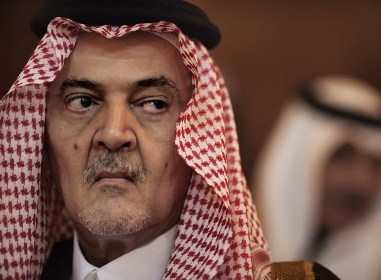Saudi FM: Economic Summit must Tackle Arab Spring
إقرأ هذا الخبر بالعربية
A two-day economic summit that opens Monday in Saudi Arabia must break with tradition and tackle people's aspirations in the wake of the Arab Spring uprisings, the Saudi foreign minister said.
"Our meeting should not be mired in routine," Prince Saud al-Faisal said at a meeting Saturday to prepare for the third Arab Economic and Social Development Summit.
"The Arab world has faced these past two years upheavals of a political dimension... but we cannot ignore their economic dimension," he added.
The minister stressed that the summit must tackle "the problems and issues that concern the lives of our people. We must meet the aspirations of the people."
Poverty, unemployment and social inequalities were among the causes that triggered a Tunisian uprising in late 2010 that later spread to Egypt, Libya, Yemen, Bahrain and Syria.
Experts have warned the Arab world risks losing the fragile gains made by the uprisings, which brought to an end decades of iron-fisted rule by leaders in Tunisia, Egypt, Libya and Yemen.
A recent economic report noted that unemployment in 2011 stood at 16 percent in Arab countries where 17 million people out of 300 million are jobless.
At the same time inter-Arab investments stood at a mere 25 billion dollars across the region.
The summit in oil-rich Saudi Arabia is expected to discuss the amendment of an Arab convention on investments in a bid to bolster the role of the private sector, the minister said.
The meeting would also examine means of drawing up new financial resources to support impoverished Arab states, he added.
IMF first deputy managing director David Lipton told Tunisian businessmen in November that Arab countries in transition should push for reforms, encourage investment, boost productivity and create jobs.
A World Bank-Gallup poll survey published on November 27 stressed the regime was in dire need of "social safety nets" to satisfy the socio-economic demands of the Arab Spring.
Sure, but can Saudi Arabia afford to bribe three hundred million Arabs to remain subjects to dictators? The king paid ten thousand dollars to each of 16 million Saudis to keep them from wanting to vote. 160 billion dollars, no problem. (Just guesses here.) So does it have three trillion dollars for the financial package to secure long-term (one year) stability?
The World Bank-Gallup poll surveyed people in Lebanon, Jordan, Tunisia, and Egypt, and found that roughly 80% or more in each country held the government primarily responsible for assisting the poor.
So if Saudi's King wants to prop up dictators so as to defend Israel's racist genocide of Arabs, he will need to spend a lot of money.
"...and announcements were made, all newspaper editors were told not to use the term “royal generosity” or anything similar to refer to financial packages..."



